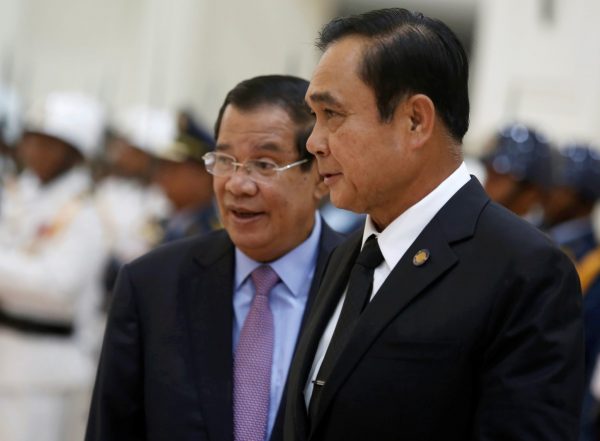In a marathon speech Xi promoted his vision for a ‘new era’ of ‘socialism with Chinese characteristics’ to be based on a strengthened one-Party authoritarian rule. In the lead up to the Congress, China’s state media lambasted Western liberal democracy for producing crises and chaos. According to China’s official news agency Xinhua, ‘[u]nlike competitive, confrontational Western politics, the CPC and non-Communist parties cooperate with each other, working together for the advancement of socialism and striving to improve the people’s standard of living. The relationship maintains political stability and social harmony and ensures efficient policymaking and implementation’.
China’s combination of firm rule, apparent political stability and economic success is turning heads in Southeast Asia where political systems are under strain. Privately, Southeast Asian elites from the Philippines to Indonesia have long expressed admiration for China’s progress, and that admiration is now finding public expression. Following the CPC congress an editorial in the otherwise liberal-leaning Jakarta Post entitled ‘Lessons from the CPC Congress’ struck an approving tone of China’s advances, suggesting that Indonesia had much to learn from its northern neighbour, particularly in the fight against corruption. The Manila Post also ran a piece asking whether other countries might learn from China’s development model.
China’s proud performance on the world stage comes at a time when democracy in Southeast Asia appears to be in retreat. Authoritarian regimes are proving durable, and public opinion in many countries appears to favour illiberal, strongman rule. Cambodia has already tied its mast to China’s ship with Prime Minister Hun Sen using Chinese economic support to underwrite his Cambodian People’s Party’s political dominance. Thailand has reverted to military rule and the Philippines has elected a man who supports extrajudicial killings. Myanmar’s fledgling democracy is stumbling as the military continues to act with impunity in its offensives against Rohingya in the west and ethnic armed organisations in the north. Myanmar’s military chief Senior General Min Aung Hlaing is a popular figure — his Facebook page boasts 1.2 million followers.
Southeast Asia’s embrace of strongman rule has its own origins. It is rooted in concerns that democracy is failing to solve critical social and economic problems. It may indeed be exacerbating them. And the complexity of the multi-layered authoritarian one-party state in China has no mimic in Southeast Asia, even in Vietnam its closest relative.
Thomas Pepinsky argues this week that Southeast Asia’s ‘trend towards illiberal politics and authoritarian leadership styles is a consequence of the perceived weaknesses of democratic politics, which has proven unable to eliminate poverty, crime, identity-based conflict or political instability’. Pepinksy attributes this trend to a desire for order, especially in places such as the Philippines, Thailand, Myanmar and Indonesia, where previous democratic gains are under threat. In addition, the non-democratic regimes remain as non-democratic as always.
In a complementary essay, Astrid Norén-Nilsson argues that it is likely the 2018 Cambodian elections will be uncontested. The Hun Sen-led Cambodian People’s Party has invalidated three million votes for opposition candidates, redistributed seats and arrested an opposition leader accused of being a US puppet. Norén-Nilsson argues that the Cambodian public’s muted reaction now ‘opens up a new range of previously unimaginable political possibilities for the emboldened CPP’, which will likely continue its strongarm tactics.
As Trump travels to Asia, questions are being asked about Southeast Asia’s commitment to the norms of liberal democracy, and whether, in the footsteps of Cambodia, more nations will be drawn into China’s orbit. Doubtless Southeast Asian nations and around the world will increasingly depend on trade relations with China for economic growth, but simple projection of China’s political model into Southeast Asia or anywhere else stretches logic and defies careful empirical scrutiny. It remains quite unclear whether China will influence domestic political developments in the region or whether it has any inclination to do so. In this respect, China’s acceptance and endorsement of political change in Myanmar was an instructive test.
Trump’s chaotic presidency is easily contrasted at this point with the order and vision of Xi Jinping’s regime. Trump, for all his foibles, leads a rich nation with standards of living that remain a Chinese dream. And, so far, the history books tell us that in the long run only representative governments have been able to provide the institutional frameworks that make nations rich. The influence of the China model will hinge on whether China can continue its growth trajectory, and propel China toward high-income status without political liberalisation — a feat never before achieved and theoretically under test.
If Xi can achieve the reforms necessary for continued growth and, at the same time, make the Party more responsive and accountable to the public, the Chinese model will attract much more attention from the region’s developing nations. But that is a big if, and as Southeast Asia knows all too well, an illiberal concentration of political power at the top carries big risks and costs that in due course undermine the resilience of the state.
The EAF Editorial Board is comprised of Peter Drysdale, Shiro Armstrong, Ben Ascione, Amy King, Liam Gammon, Jillian Mowbray-Tsutsumi and Ben Hillman, and is located in the Crawford School of Public Policy in the ANU College of Asia and the Pacific.


What may be happening is that, as the world is facing an upsurge in Muslim militancy, public opinions in East and South-East Asia, the only region of the world that is still relatively Muslim-free, are putting a damper on the drive to more democracy. Over the last 40 years Wahabism has taken advantage of democracy, globalization, trade and migration liberalization, to promote and spread undercover its extreme version of Islam. The Far-East most probably does not want to be confronted to the same sort of problems that have been afflicting the West for the last, between 15 and 40 years. My guess is that the march to democracy will probably not resume before Islam is completely neutralized. Which might take between 10 and 50 years…